PRESERVING A MILITARY LEGACY FOR FUTURE GENERATIONS
The following Reflections represents SSgt Rob Matlock’s legacy of his military service from 1977 to 1999. If you are a Veteran, consider preserving a record of your own military service, including your memories and photographs, on Togetherweserved.com (TWS), the leading archive of living military history. The following Service Reflections is an easy-to-complete self-interview, located on your TWS Military Service Page, which enables you to remember key people and events from your military service and the impact they made on your life. Start recording your own Military Memories HERE.
Please describe who or what influenced your decision to join the Air Force.
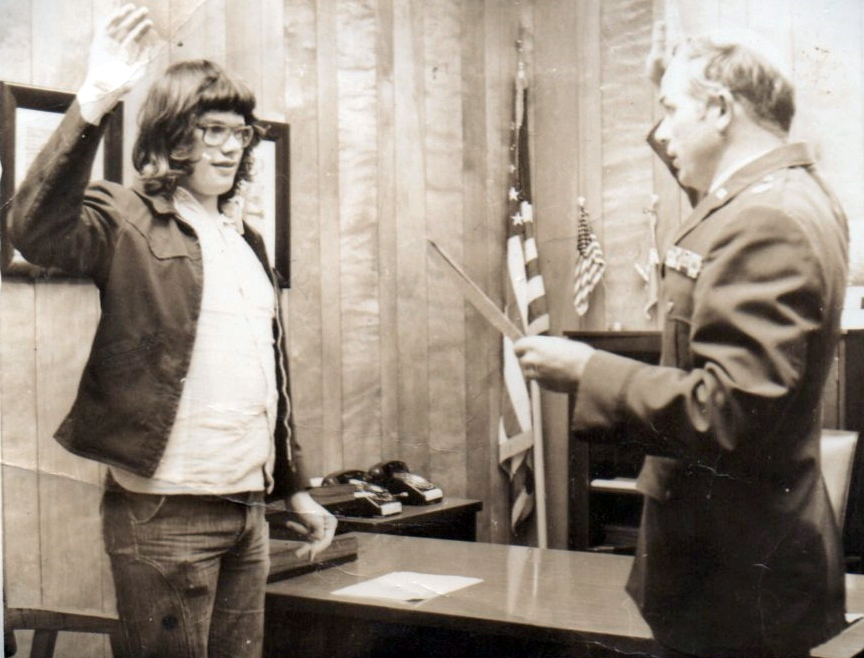
My father was in Korea, and he regretted not reenlisting and making the USAF a career. He told us stories of his time in the Air Force with such enthusiasm that I wanted to experience what he described. My uncle on my mom’s side learned to fly helicopters in the AF and talked to me about the training that I could receive in the military and how it could help me get a job if I got out. My girlfriend and I talked to an AF Guard recruiter, and I joined ANG at 17 1/2. I went to Basic, and she decided she did not want to go. She married someone else while I was in photographer training.
I joined the regular AF on January 16, 1980, and I spent 21 years and ten months in the military. My dad was happy that I got retirement, which was one of the reasons he regretted not staying in.
Whether you were in the service for several years or as a career, please describe the direction or path you took. What was your reason for leaving?
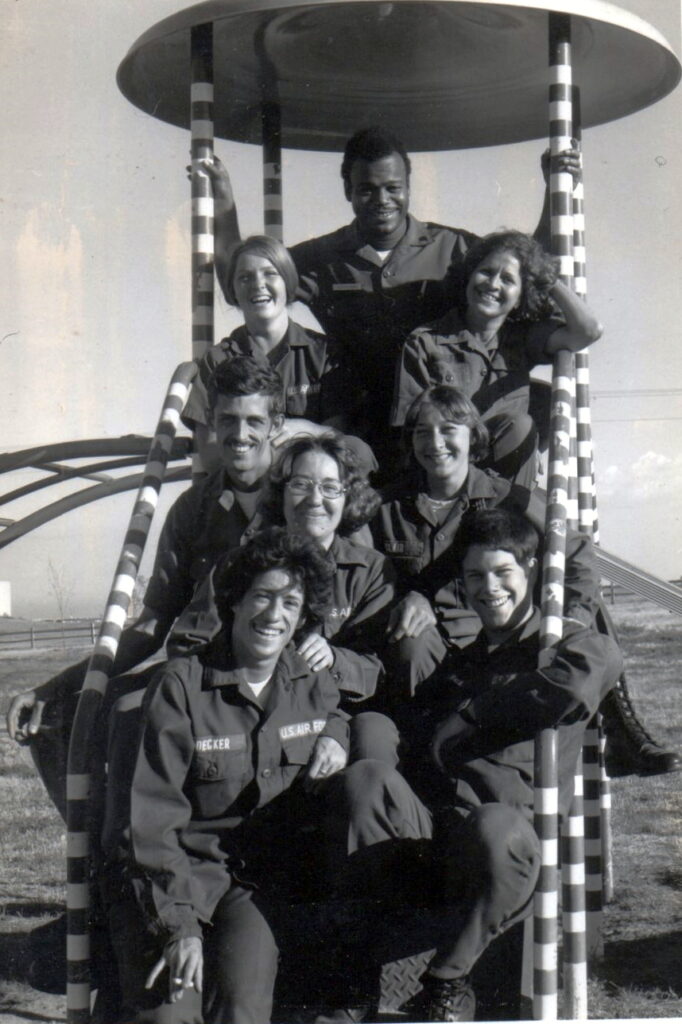
I started In the ANG and AF as a photographer, and I spent six years as one. They sent me a letter telling me that if I didn’t pick a job, they would choose one for me, or I could get out after my hitch was up. With a family, I decided to select another job, my first choice was computer programmer, but its eligibility closed out before my paperwork was completed.
So, I picked Disaster Preparedness; not my ideal job, but it was mostly inside. The cross-train was supposed to increase my promotion opportunities, but I never got promoted in this job. The average promotions in this job were about seven a year throughout the entire AF, and I missed promotion by less than 2 points 6 times. I retired in 1999, that’s why I left.
If you participated in any military operations, including combat, humanitarian and peacekeeping operations, please describe those which made a lasting impact on you and, if life-changing, in what way?
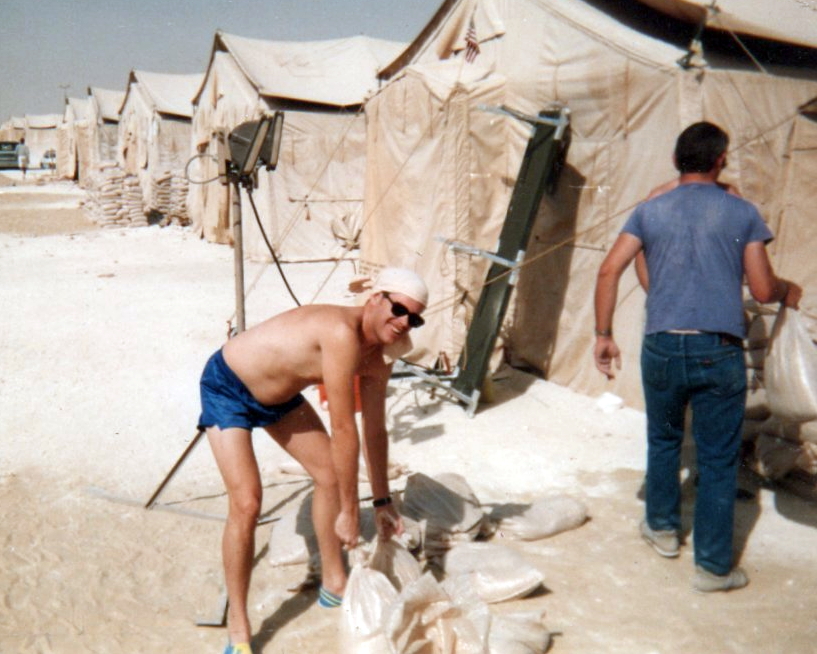
Dec 1977, I Joined the 134 ANG SQ in Tulsa, OK. I went to train at Lowery AF. Entered the regular AF in Jan 1980.
Jan 1980 – Dec 1984, Alert Photographer and Photographer for the base newspaper at Barksdale AF. I photographed crime scenes and autopsies, base functions, and aircraft arrival for the 8th Museum. While a base photographer, I won awards and had photos in SAC publications worldwide.
Mar 1985, I cross-trained in Disaster Preparedness and Moved to Myrtle Beach AFB.
Mar 1986, Team Spirit 1986 In support of the Deployment of the 366th TFS, Screaming Demons, I taught the ROKAF forces Nuclear Biological and Chemical survivability and decontamination operation. I worked with CMSGT Witcomb from PACAF H, and I learned about improvising under field conditions.
Apr 1987, PCSed to Balkier TU, I went on a Short Tour as the Disaster Preparedness NCO to the 7391st Munitions Squadron. While there, I rewrote the Detachment’s regulation supporting USAFE’s guidance on Disaster Preparedness. I traveled around Turkey and found it a fascinating place filled with many archeological sites, beach resorts, and kind people.
Through the MWR program, we spent most summer weekends in a resort town. We would also go to Izmir to conduct personnel matters and shop at the Commissary and Base. We had a flag football team; we came in second in the regular season; we were the 1st place team that only lost. We lost two games. We won the postseason, but the committee awarded the trophy to the regular-season winner.

I had to go back to Tulsa on emergency leave because my dad had quadruple bypass surgery. On my way, I was running behind for my flight and asked the driver to speed me to the airport. When we turned onto the road next to the Bosporus, he hit a patch of sand, and the car spun three times; I thought I was going to die. Somehow the driver regained control of the taxi and got me to the Ataturk Airport with 1/2 an hour to spare, and I tipped him 20 bucks. My dad’s surgery went well, and he recovered quickly; I returned to Turkey 2 weeks after leaving. I returned to Myrtle Beach AFB after the assignment ended.
I learned self-reliance and all aspects of accomplishing the Disaster Mission while at the Detachment.
Sep 1989, Hurricane Hugo hit Myrtle Beach; it was destroyed. I was awarded the Humanitarian Service Medal for aiding Myrtle Beach’s clean-up.
Sep 1990, we had just returned from my brother Dennis’ wedding. On the day I signed back into work, Iraq invaded Kuwait. The base went on immediate alert, awaiting further order. We had to stay close to the phone till they decided when or if we would be going to the sandbox. The next few days were tense, and we readied equipment, packing supplies, and checked our war directives and plan. Our NCOIC Leo had us order a pallet of toilet paper to use as packing material and trading material. This was a great idea, as we would find out later. The loading plan specifically stated that we would receive radios from the Communications Squadron when we got to our deployment site. Knowing nothing goes as planned, we packed 8 of our handy-talkies, three office chargers, and a car charger. We left a note for any backfill unit; we left them two radios, three if the one at Comm gets fixed, the base station, and the radio in the Mobile Command Post. It is a good thing we did; not only would we not have radios, but the Base Commander would not have had any either. It took Comm 3 weeks to come up with a radio. Then when they did, all the base commanders were on our radios, we had to come up with radio codes so we could talk bad about people and them not know what we were saying. In a couple of weeks, we had everything on the list and everything else we could sneak into the package ready to go.

We could not be far from a phone, and we had 30 minutes to report when we got the call. My heart pounded every time a phone rang. I went over the household bills, payment dates, the budget, who to get ahold of if the car broke down, and everything I could think of that would make my absence easier. My unit got our wives together and had them swap numbers. The Major’s wife became momma bear for all the others. Then it came, the call, we were to meet at the departure hanger at 1600.
We processed through the line. Sgt Mark “Sparky” Akeroyd, Sgt Sean “Stretch” Vasvary, MSgt Leo “Leo” Spring, SSgt Ray “Kicker” Maloney, Maj Walter West, The EOD troops, and SSgt Joe Lightfoot I got a shot; the nurse complimented me on how nice my rear-end looked. C5 Galaxy filled with fog, and I could touch my nose and not see my finger; the fog cleared when we got to flight altitude. It was an 18-hour flight; we stopped at Torreon AB, Spain, slept on cots in a crowded hanger for 4hrs, drank free coffee, and bought all the junk food we could put into our pockets. We departed for Saudi.
A few hours later, we arrived at a darkened end of a runway, with no lights, no indication of life, except a giant scarab beetle crawling in the sand. The Commander told us we had to use our tactical lenses on our flashlight because there might be snipers (He said this because he, too, had NO idea where we were. As we stood in the moonlight, our eyes adjusted to the moonlight, we could make out what looked like buildings in the distance. We smoked cigarettes and waited. After a time, we saw the light in the distance, vaguely headed in our direction. We did not know what we were looking for; we hid behind the pallets; only a few officers had handguns, and the rest had knives and flashlights. The light wended its way around an unseen path, coming slowly close. As it got closer, one light became two, and we recognized it as a single-vehicle; at least it was not a caravan of the enemy, maybe one vehicle had enough to get some of us, but the rest of us could take them. We recognized it as a blue Air Force bus as it pulled up, and we were glad to see it. The driver was mad that we had not already grabbed our personal/A bags, so he had to wait on us to grab our gear, get on the extremely crowded bus, and head to who knows where. The driver dropped us at the billeting tent, where the Sgt in charge told us to go out the backdoor of the tent and find a tent with cots in it, and they would get us better accommodations in 4 hours at sunup. We walked into a dark tent, our whole squadron grabbed one tent to ourselves, and we dropped onto the cots and immediately fell asleep.

Met Sgt Jimmie Jam and SSgt Chris “Ground Hog” Currie, who had a step van at 430 am, just after sunrise. They took us to a contractor chow hall, and there was already a line. I ate Indian chicken for the first time and some breakfast. There was an ice cream machine, which was very popular. There was also a flying warning about Camel Spiders; it said, “They can traverse desert sand at speeds up to 25 miles per hour, making screaming noises as they run.
They can jump 4 to 6 feet straight up in the air.
They will chase you down like a hungry lion.
The flesh and muscle fall off if they bite you, leaving a hole.
They are venomous, and their venom contains a powerful anesthetic that numbs their victims, thus allowing them to gnaw away at living, immobilized animals without being noticed.
They live in shady areas, underneath bushes and vehicles. You need to check your boots before you put them on.” The flyer included a picture that was straight out of a nightmare. We lived in fear of dying from them. (Later, a similar-looking fake flyer was placed next to it with a picture of a camel spider the size of a tank knocking airplanes out of the sky with their spit, I laughed, but I still checked my boots).
Later we met Maj Richard Sutherland, who had got a tent and for all Disaster Preparedness (DP) troops to move in. Leo showed up with TSgt Slow Sam Sheppard, another DP troop. Leo and Sam smoked in the tent, which inflamed Ray’s eye condition.
We went looking for a building to set up shop. After a short search, we found a compound of 2 buildings, two ponds, one outhouse, and a fence surrounding it. A cement contractor previously occupied the facility; the two ponds were used to supply water for making the concrete, but they were largely empty. The building on the left was newer and was empty on the inside; the building on the right had two large tanks in i. We placed the equipment in the left building and set it up as our warehouse, and we opened the nested boxes turned them sideways, and used them as a shelving unit. The right building became our office, beside the large tanks, had a window unit AC, a refrigerator, and some office furniture.

In addition to setting up the warehouse, we swept, mopped, cleaned, fixed, moved furniture, basically whatever it took to set up the facility for was. We filled a ton of sandbags to harden the facilities. There was an old port-a-potty that we could use as a latrine if we could figure out what to do after it got full. This potty was a lot better than the plywood and chicken wire latrines that were around tent city. There were flush toilets in the dining facility and Survival Recovery Center (SRC), but there was always a line to use them. Another advantage we had was the thousands of rolls of toilet paper. We could wipe our butts, even if we used a stick to knock the poop pile down and hold our noses. Slow Sam was not much of a DP troop, but as a scrounge, he was unmatched; he turned half that toilet paper into much-needed equipment. He got me a bayonet, a night parka, and another item. I guess toilet paper’s value goes way up when you do not have any.
The Command Post/ SRC is set up in an abandoned garage. It took a lot of sandbags to fortify the place. We brought over our checklist plotting equipment and put in a requisition for maps, 1:2500 and 1:10,000 for chemical downwind plotting. We were able to find folding tables to set up the SRC. The SRC got set up in the old repair bay, and we had a large garage door to fortify; the Command Post was in the old parts storage room, with no huge door to strengthen. We then had a meeting with Wing Commander Col Sharpe, and he tasked the necessary units to man the SR. When the unit representatives saw we had radios, they were mad they did not do the same thing and bring their unit radios from stateside. The Wing Commander saw the radios and directed us to give him two till he could get the Communication squadron to provide him with some. This led to our radio frequency becoming the command network frequency. We start sandbagging everything, our offices, the CP/SRC, and our tent. At least there was plenty of sand.
Capt. Donald “Big Guy” Cacamisse, SMSgt Sonny “Swamp Fox” Mills, TSgt Steve “Phoenix” Stroud, SSgt Bob “Buck Rogers” Grijalva, Sgt Jackie “Lady” Kennedy, TSgt Joe “Bear” Garza, SSgt John “Cobra” Douglin, SSgt Hank “Long Toe” Price, Sra Don “Bond” Huisjen, Sra Dave “Dusty” Little, SSgt Jim “Hormone” Figart and TSgt Sam “Nuthin” Sheppard, and SSgt Scotty showed up shortly after we found a place to set up. Jimmie Jam left in October when his enlistment was up, Sonny and Douglin left before Desert Storm started, and SMSgt Dave showed up as a replacement for Sonny and brought SSgt Scotty. Danelle Watts was assigned as an admin troop, and we also got an Airman named Wes (That’s all I remember, no last name) to help us.

Our days were spent coordinating with all base units on Chemical, Biological, and Nuclear (NBC) protection needs. We also provided training in using NBC equipment, set up remote chemical detection units and a base-wide alerting siren, made flyers instructing in NBC operations, created a checklist for NBC response, developed redundant communications channels, and briefed the Wing Commander on actions taken. We acquired items necessary to set up a Contamination Control Area (CCA), organized the equipment into its wartime posture, and drilled unit members on their responsibilities during an attack and afterward. Ray and I were the main unit coordination persons, and I also produced the illustrations for the flyers (Some of which can be found online on the Desert Shield/Storm website. The job involved traveling to every unit on base, so we got to make many connections in case we needed to ask for favors; plus, we knew our way around, which made it easier to visualize when asked questions.
We moved into two tents; at first, I was in the same tent as everyone I flew over with (Except for Maj West, who lived in officers’ quarters. The tent had 14 men in a 12-man tent, while the second tent only had six people. The tent was so crowded I had to put everything under my cot, and I had to climb to the cot from the entry. It was claustrophobic; no privacy, and I could not get any sleep when I was on the night shift. Don and Dave lived in the other tent, and they put mosquito netting up to create rooms to provide privacy. At first, I thought it was a crazy idea, but after a few sleepless days (In which I went crazy on a bunch of my compatriots who could not stay out of the tent while I was sleeping), I decided to take them up on their offer to move it. I started with netting, but later someone came up with a large roll of material; I used it to make a room almost three times the size of my previous space. Sam got everyone footlockers, and now I had room for everything. I also gathered up 5 Meals Ready to Eat (MRE) boxes, in which I was able to make a chest of drawers. I got an extension cord and a drop light and set up a pretty nice room. Later, I bought an exercise bike and put it in my room, with all the comforts of home.
During Desert Storm, my girls got to take a picture with Sgt Slaughter at the BX, and they sent it to me.
After the initial setup, things fell into a routine. We got up at sunrise and went to breakfast; at first, we had to pile into the step van and go to the contract dining hall, but within a month, the chow tent run by AF personnel was set up. It was set up across the street from our tent. After breakfast and a stop by the latrine, we would load up the vehicles and head to the office. Motor pool traded our step van for a Jimmie pickup and a Humvee. I got to use the Humvee as my primary vehicle, it was so fun, plus it was a REAL military vehicle. The trouble I got into with driving that thing was a legend (I will go into detail later. We would have a short meeting and go over our assignment. Ray started working in the SRC with Sonny and Sean, and Don and Dave were assigned to me to teach Chemical Warfare (CW) classes and check on the M43a1 chemical alert alarm. We drove around the base together; it was a lot of fun, despite being at war. Sonny took over from Maj Sutherland as unit dictator.
A normal short tour deployment lasts 90 days. As the 90-day mark approached, word came down from Centcom HQ, duration, not rotation, and we were to be there till we liberated Kuwait. We were disappointed, though it made sense not to get everyone there and spend more money to switch us out. Jimmie Jam was lucky that he got out when he did, or he would have been forced to stay under Stop-Lost. TSgt Garza was a Stop-Loss holdover and not allowed to retire. On that day, his personality did a 180% change. He went from being happy-go-lucky and funny to being a very angry man. Most people avoided him rather than get their heads bit off. He just stayed in the office away from everyone. I do not blame him. When my retirement day came, I could not wait for it; I wanted it to get there so badly. Like me, I think Joe loved the AF, but it is time to let the younger troops take care of protecting the country at a certain age. We were there till the end, for good or ill.

I relieved Sonny in the SRC so that he could get some chow. About the time I started to look through the pile of MRE leftovers looking for the bean and weenier packets, a frantic call came over the radio, “Shots fired at the contactor chow hall, repeat shots fired.” then TSgt Brown, the SRC rep (Who was the only man in camp wearing blues) told me he was going on-scene to see what was going on. About 10 minutes later, he calls over the radio to stand down; everything has been resolved. A few minutes later, he showed back up, and I asked him what had happened. He told me a hospital troop accidentally discharged his M16, the troop, like all medical personnel, had no weapons training. We will never know why they were given weapons, as it violated the Geneva Convention for medical personnel to carry a weapon. The Airman had put his loaded clip in with the bolt open, then closed the bolt stripping a round and putting it into the chamber. He then locks the bolt back, which loads another round into the chamber area. He then sets his weapon down to eat, which sends the bolt forward, causing the second bullet to strike the first, making it fire. This almost caused a riot; everyone hit the floor, and food flew everywhere. Those inside the chow hall thought the shot came from the outside, so they all sent their bolts forward and faced the building entrance.
Everyone outside knew it came from inside the chow hall; they all took cover, sent their bolts forward, and turned toward the chow hall. TSgt Brown said the tension was thick as mud when he showed up. He asked if anyone had heard any more shots, and everyone said no. He let them know he was a sop, and they were to lower and clear their weapons; he would handle it from here. He approached the exit to the chow hall and announced that he was an SP and now was about to enter, and please don’t shoot him. He slowly opened the door, and he said a hundred weapons were pointed at him. He told everyone to point their weapons toward the ceiling calmly. He asked a few questions, found the embarrassed Med Tec, cleared the situation, and returned to the SRC. Shortly after that, the Wing Commander made all the Medics turn in their weapons, saying it was more dangerous for them to have them than the Iraqis.
We played 2-man volleyball at sunset. Sean and Rae were an unstoppable team; Rae was an exceptional digger and setter. Sean could reach a mile above the net to block and spiked so hard he could flatten a ball (or your nose. Ray and I played them competitively; we were both excellent setters and diggers; we could pass and misdirect to find the open spot, we never beat Rae and Sean, but we had a winning record against the other team. We would score a lot of points against Rae and Sean. We would wear them out by long volley matches, Sean did not have a lot of stamina, and that is where we would work them. Most teams tried to win by spike serving and blocking; Ray and I would almost always dig, bump-set, and return (sometimes a spike. We would catch them bouncing up and down trying to block, then dink it over when they went back down. It was a great exercise.
Many celebrities showed up; Bob Hope came by early and filmed us for a Christmas Special with the troops, just like I used to watch as a child. He brought his wife Deloris, Aaron Tippin, and Johnnie Bench; he could not bring Brook Shields or Ann Jillian because women without husbands could not travel in Saudi Arabia. Bob and Deloris visited the cam. He told jokes about camp life, including naming our camp “Canoose City He Named us after the name of the company that cleaned our latrines, the Canoose Brothers. That night almost the entire Wing and all the 101st Airborne came to the taping. I was able to get close to the stage, and I am visible at 32:09 clapping over my head. I was one of those soldiers in the crowd at a Bob Hope Specials, just like all those other young men who loved and fought (Some died) for their country, amazing!

I met many other celebrities, such as Thomas, “The Hitman” Hearns, Willard Scott, Maj Dad (Gerald McRaney), and his wife Susan Sugar baker (Delta Burke), and others I do not remember. A lot of celebrities came over. When Gerald McRaney and Delta Burke visited, I made a sign saying, “Greetings from Canoose City” Maj Dad asked, “Where the hell is Canoose City?” we all yelled, “Here! I later talked to Sec Defense Dick Cheney and the Chief Master Sergeant of the Air Force about family suffering because they cut off separate Rations. I asked if they knew how much that hurt the families back home and worried those serving in the desert. I told him I did not know how to feed my family now that they had cut my pay by $200. Cheney looked mad, and the Chief rushed him along to the next group of Airmen. Eventually, the money was given back to our families.
I went to Dhahran Mall 3 or 4 times; I ate at KFC (A little taste of home), bought mixed tapes 3 for $5 (started 4 for $5, then went up to 2 for $5 Up till then) only had a Temps and Tops tape. There was a trough in the restroom against the wall, and it looked like the urinal at the Myrtle Beach Speedway. Later, there was a sign placed above it saying, “This is not a urinal, but a foot-washing area” oops. There were things at the mall not available in the USA, such as camel sandwiches and live piranhas; I bought a Cuban Cigar. I also purchased that exercise bike I mentioned earlier; I rode the exercise bike in our shop, then later moved it to my ten. While we were walking, a Saudi in a big car tried to run us over as we crossed the street; we jumped into someone’s yard to avoid being hit (I think if they were really trying, we would have been dead. Jackie and I were walking by the mall one day when a Saudi cop whacked her on the ankle with a riding crop, saying, “Cover your hair better” I almost popped the little dude in the head, but Jackie grabbed my arm and told me, “No, you do not want to start a war. The Cop said, “Is this your woman?” in the local customs briefing, and I got told to say, “Yes,” that is what I said; the Cop said, “Better teach her better. I said I will, and we walked away. Don and Dave said they would have beat him and laughed.
Don and I ran around the camp every night at sundown; every lap was 1 kilometer; we would do five laps for a total of 5Ka a day. A 10K run was organized by Morale Recreation and Welfare (MWR); Don and I entered. I had never run more than 5K, so we thought it would be nice to challenge ourselves. We lined up with a lot of other apparently bored folks and ran, Quickly Don and I were left in the dust, and it got to the point that we could not see the runners in front of us; the only way we knew we were going the right way was the road marshals directed us. As we came down the final straight, Don and I ran side-by-side. The idea was to cross the line in a tie for last when all of a sudden Don started sprinting; I said, “What about the plan” he said, “Screw that I’m not finishing last” jerk, he just barely crossed the line ahead of me.
MWR set up a swimming trip to swim in the Persian Gulf. It was men only because of Saudi laws against men and women swimming together. Because of this, I have swam in 2 gulfs, two oceans, and three seas in a year. Nothing special the water was extremely salty; I rode the whole way back to Canoose city feeling crusted over.

Good Morning America came to King Fahd AB for a live broadcast. All of us DP troops were excited; we made a big sign and scouted a spot. Ray and I went to chow, and as we pulled into camp, there was a loud sound; I thought someone had slammed a dumpster li. Ray said, “That sounded like an explosion” we called the SRC to find out if we were under attack, but instead of Sonny answering, TSgt Brown got on the radio and told us, “Someone needs to get in here, Mills (Sonny) is in a ball on the floor Ray and I started the truck and tore out to the SRC. We are listening to the commanders on the radio; it is apparent the base is not under attack; the explosion was some kind of accident. We get to the SRC and find out that the Army had accidentally shot a missile into the ammo dump. Sonny is nearly in a catatonic state when we arrive. Ray got Sonny onto the nap cot behind the maps; Sonny just laid there moaning uncontrollably. I got out the accident control checklist, and Ray started to assemble the Disaster Response Force (DRF). I directed over the radio for all non-essential personnel to get into bunkers, and we did this in case the ammo dump blew up.
We then directed that all DRF personnel assemble in the SRC parking lot. EOD reports from the scene that no one was killed; there were only a couple of people in the dump, as everyone else was at lunch. The folks with their ears ringing, but all were out. EOD and Ammo picked up the cluster bombs that were scattered. The whole situation was handled in plenty of time for GMA to broadcast. We released everyone from the bunkers, went to pick up the DP troops, grabbed our sign, and headed to the spot we picked out for the broadcast. Later our wives said they saw our signal. An equipment malfunction caused the accident during a helicopter repair. The pilot accidentally fired the Hellfire Missile while testing a repair. Sonny was relieved of duty and sent back to the states within the week. SMSgt Dave showed up with Scotty 3 weeks later.
The cooks at the AF chow hall did not have a lot of cooking experience; stateside contract employees did most of the cooking, and AF personnel mostly served the food, not cooked. The King Fahd contract chow hall had better food, but it was mostly Indian food, spicy and not something I was used to. I was standing in line when an airman was using a boat oar in a huge kettle, stirring a load of rice. He counted “58, 59, 60”, then said, “Bring me a pan. I called to the MSgt in charge of the line and pointed out that Minute Rice was a brand name, not a recipe. Sarge stopped the troop and told him to let the rice sit for 5 minutes, then serve That explained why the rice was always crunched. At Thanksgiving, the AF chow hall received enough turkeys for everyone to have a slice. However, the way they prepared them made them dangerous to eat, so instead, we got canned turkey and shrimp. They displayed beautifully on top of the line, but we had to eat wet tasteless turkey rolls. I got on TV eating a shrimp behind the reporter, and my mom said she saw my grinning face. We stopped by the chow hall to get some ice one morning. While we waited on the Sarge to get the ice, he stood up, went to the refrigerator, and removed two eggs. Sarge then told the troop to stir a kettle full of powdered eggs faster; Sarge then took the eggs and smashed them together as the troop stirred in the eggshell. Sarge then turns to us and says, “You know why I did that?” I told him my dad used to be an AF cook and told me he used to stir eggshells into a kettle full of powdered eggs so that everyone who got an eggshell would say to their buddies, making people think they were eating real (better tasting) egg. He said that I was right and not to tell his secret.

We had a 40-inch Sony color TV (Due to radiation hazards, TVs that size was never sold in the USA, The TV was hooked to a satellite dish that allowed us to receive Air Force Radio and Television Service (AFRTS) and CNN. The idea behind the TV and satellite was that CNN warned of attacks quicker than Intel. AFRTS also broadcast 5-year-old WWE matches and series that failed in the USA. Hard up for entertainment, we would watch anything. Live sports were also broadcast, some NBA, NCAA basketball, some bowl games, and the NFL Playoff. On January 12, 1991, at 9 pm, the Buffalo Bills played the Miami Dolphins. Don, Dave, and I decided we would go to the shop and watch the game. The Bills won 44-33.
I raced my Humvee vs. Don and Dave’s Jimmi for more fun with the vehicles. The Humvee was full; Ray, Sean, and Scotty were in there with me. The rules were simple, enter the compound fence, take a left and follow the fence line around the 2-evaporation ponds. The pond at the end of the circuit was right next to the fence. The idea was to get to the entrance to that final leg and stay ahead. I rounded the backstretch and hit the gas; pulling ahead by about half a car length, Dave was determined not to lose; he went up on the embankment of the pond and almost cut me off. I turned a hard right, stomped the gas, and got to the end of the pon. As I exited the pond area, I hit a HUGE mud puddle. We had the turret (Sunroof) open, the inside of the Humvee, and all of us got soaked. It was worse on Don and Dave in the Jimmie, and they hit the deepest part of the mud puddle. The Jimmie stalled out in the middle of the puddle, and we had to throw them a tow rope. Don had to get out in the middle of the calf-deep muddy water to attach the rope; he was not happy. This would be the last time we raced around the ponds; 1st reason Capt. Cacamisse came out and caught use towing the Jimmie, 2nd, and Desert Storm started shortly afterward. Don was mad because he never got a rematch.
As war approached, we supervised the setup of a network of alarm stations. We guarded contractors setting up alarms, and I asked why we had to carry guns to watch them set up the alarms.
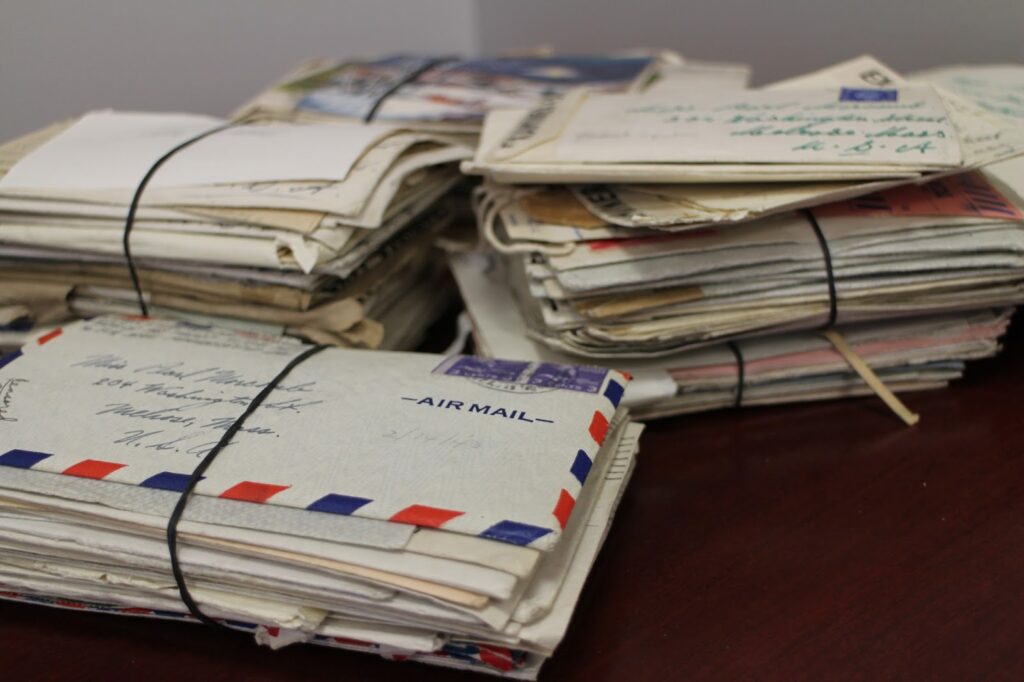
I got many letters from Kathy and the kids; I even made a videotape for them. I also got a lot of cassette tapes from mom and dad. The tapes had them playing songs recorded off the air from KVOO and talking between songs. I wish I had those tapes; I would love to hear their voices again. I got to call from the Command Post to Kathy. They set up a commercial Pay Phone service. I could call collect to all my relatives, talk to my brother Dennis, and give me a eulogy; I told him to save it till I died.
I got a box from Kathy and the kids for Christmas, and I got some games and a tiny Christmas Tree.
Jan 1991, Desert Storm
Beginning shortly after New Year’s, the AF directed that we were to start taking Pyridostigmine Tablets P-Tabs. This was to protect us in case we were exposed to nerve agent. We were preparing to go to war. We also all lined up to get anti-Anthrax shots.
We started wearing our MOPP Gear, MOPP. The suits were very hot and uncomfortable, and we had to drink a lot of water. As I sat for 12-hour shifts in the SRC, I sharpened my bayonet. I sharpened it like crazy, got it razors sharp. I spent hours doing this to keep my hands busy and to keep me from being afraid of what was about to happen. I was so sharp I decided to shave with it; it worked as good as a razor. However, halfway through the shave, I realized I was startled I could cut my throat. I finished with a safety razor.
On January 17, just before 2 am, a mighty roar of aircraft woke us up. As we exited the tent to see what was happening, an announcement informed the camp, “Operation Desert Shield has transitioned. We are now in Operation Desert Storm. The liberation of Kuwait has begun. I turned and shook Ray’s hand and said, “Welcome to war.
Meanwhile, we looked up, and 100 F15s flashed their light. They were on the way to Kuwait to bomb Saddam. For the next six weeks, we were in a shooting war. Col Sharpe came in and quoted scripture from the book of Revelation, which freaked us out. We started to worry if Jesus was about to return.
The 101st Airborne helicopters started to take off and headed to invade Kuwait. Hundreds of helicopters of all sizes and shapes lifted off, the ground shook, and the noise was deafening. I was afraid for the enemy and glad the helicopters were on our side.
During the war, HQ showed a lot of footage from gun cameras showing how accurate our Smart Bombs were. We got to see many more mission tapes from A10s and Apache Helicopters.
These tapes were very detailed.

I was sleeping one night when suddenly, the light came on in my room; as I awoke, I wondered why it was on. I opened my eyes and saw a man in a WWII uniform standing, so a shadow was on his face, but I could see his old-time helmet and uniform. He said to me, “Get your stuff and get in the bunker” I said, “HUH?” he repeated his statement, then the room went dark. That was when I woke up for real; startled by a vivid dream, I sat up. Just then, the Scud siren sounded, and I jumped into my gear and was the first one to the bunker. As the ground shook, the Scud hit 5 miles from our base. I say that mysterious man was my guardian angel, and my guardian angel cussed. I got a head start to the bunker because of him. We suited up and tested for chemical warfare agents, and tests were negative Early the following day, we searched for the explosion crater to run further tests, but it was still negative. We found a 10-foot hole in a Sabot, an underground lake, in which the Scud had entered and disintegrated due to poor construction. What we felt was not an explosion, only the impact of the Scud. After this and many other Scud launches, in which no trace of chemical agent usage was detected, we started removing our MOPP Gear, only donning gas masks and ponchos; this was the King Fahd option.
We lost seven aircraft in combat, and two pilots were killed from being shot down.
Another of the aircraft that was hit by enemy fire but not shot down was piloted by Col Sawyer, the deputy commander and Commander of the 23rd TF. When he returned to the wounded aircraft and landed, he came over immediately to the SR. He strutted into the room like a rooster into a hen yard, standing tall, head up, wild-eyed. We applauded his Airmanship. He was the happiest man on base that afternoon.
The ground war began on February 24, 1991, and we hit the Iraqis with such overwhelming force they could not drop their weapons fast enough. Hundreds of thousands of them came out and surrendered, and we had a hard time accommodating them all. There was a prisoner of war camp by the flight line, and they yelled, “We love America!” anytime we drove past them.
We could tell the war was winding down, and the A10s were having trouble finding any more SCUD missile launchers to destroy.
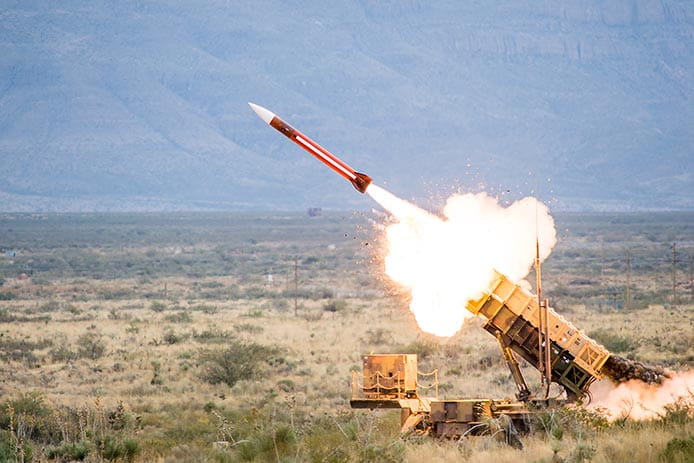
On February 25, 1991, Don, Dave, and I worked out at the gym. When we worked out, we would challenge each other, calling each other girls and weaklings to push each other to greater lift. On this day, the SCUD siren went off, and we were a little lax in getting into the buried CONEX that acted as a shelter outside the gym ten. Don was standing at the shelter door, and I told him to quit looking for a SCUD and get in the shelter before it hit him. He turned and said, “You are crazy; it’s probably headed to Israel” at that moment, the ground shook, and Don dived into the shelter. The SCUD hit 20 miles away at a US Army barracks of the 14th Quartermaster Detachment, out of Greensburg, Pennsylvania, stationed in Dhahran, Saudi Arabia, killing 28 soldiers and injuring over 10. So close to the end of the war, it is a shame they die. Apparently, the SCUD was hit by a Patriot missile that diverted it rather than destroyed it.
On February 28, 1991, we announced that the hostilities were over. We won Desert Storm. We cheered and whooped. We shook each other’s hands. We won! We would soon go home. Some of us cried, survived, and were warriors and war heroes. We would take forever a part of that fellowship of the brave that went off to war and returned. Most of us were without physical injuries, but the experience changed our life, death, and sacrifice views.
MISSION ACCOMPLISHED!
Mar 1991 Returned to Myrtle Beach AF. Shortly after our return, the base got designated for closer under BRAA. We shut down to the base, and I PCSed to Cannon AFB in Oct of 1992.
July 31, 1999, I retired from the AF.
Did you encounter any situation during your military service when you believed there was a possibility you might not survive? If so, please describe what happened and what was the outcome.
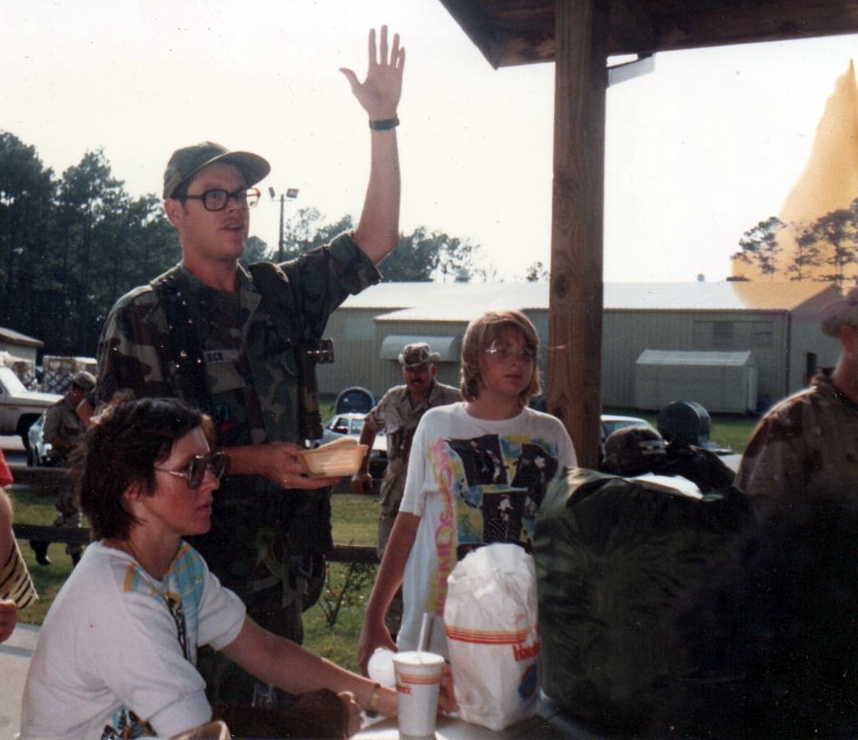
All the time I was in Desert Shield/Storm, I wondered if I would survive. One particular incident happened after hostilities were over.
With the war being over, we began to pack up, disassemble the bunkers and get ready to go home. While Bob, Scott, and Stroud packed the equipment, Don, Dave, and I were tasked to take down the bunkers, everyone helped load the Jimmie, and we would unload it into the pit where the Mountains of the Moon were. When we got to the cliff, I backed up, and we threw a few bags off; when Dave said, “Why don’t we do a Jimmie Dump Truck,” I said, “WHAT?” he said, “A Jimmie Dump Truck, you back up to the edge of the hole quickly slam on the brakes, and everything empties out of bed.” I said, “Let’s try it,” so we did. I backed up fast, slammed the breaks, and the bags mostly went over the edge; I was scared to get too close to the edge; I did not want to end up at the bottom oak a 40-foot drop. Some of the bags did not go in.
Don and Dave made fun of me, saying I was scared and a girly man. We went back for another load, and this time I backed up faster, braked later, and stopped 2-foot from the edge. The bags shot 10-feet out of the back of the truck into the hole. It worked like a charm, and we did this for six trips without a hitch. On the 7th trip, unbeknownst to us, someone had put a 2×4 in the back of the truck. When I got to the site, I backed up, as usual, slammed on the brakes at the appointed time, and as the bags headed for the pit, the 2×4 jammed across the bed opening, and half the bags hit the board and drug the rear end of the Jimmie’s back tires slipped off the edge of the cliff. It came to a stop, half hanging off the edge, gently rocking, as we were scared that we were going to die after the end of the war. I was driving, Don was in the middle, and Dave was on the passenger side. Dave and I glanced at each other; after all, being by the door, we could get out; better one should be in danger than all three of us dying. Suddenly, sensing our thoughts, he got a death grip on our arms and said, “You two ain’t jumping out to leave me to die. We got to come up with a way to fix this, TOGETHER!” he was right.
So, I called Scotty and told him to bring the tow rope, the Jimmie was broke down again, and we needed a tow. Scotty and Ray showed and saw our predicament and started laughing. We screamed, “Hurry up and get us out of this” they got the rope to the Humvee and the Jimmie bumper and pulled us to freedom. When we got on solid ground, we jumped out of the truck and kissed the ground, and then we threatened to beat Ray and Scotty up if they mentioned what happened. Surprisingly, they told no one. That was the closest I ever came to dying.
Of all your duty stations or assignments, which one do you have fondest memories of and why? Which was your least favorite?
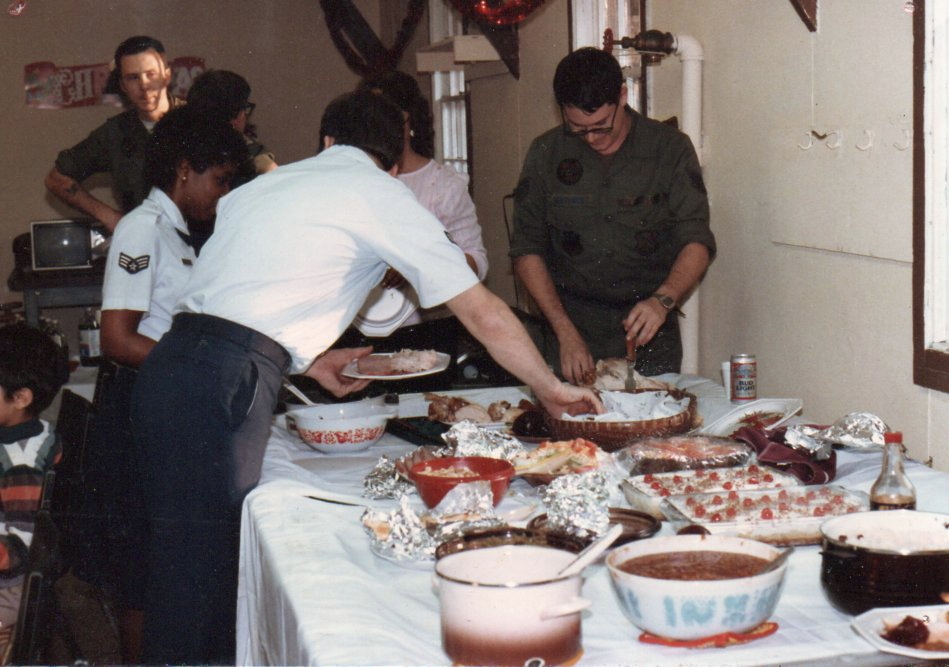
My two favorite assignments are a tie, Lowery AFB for Photography Tech, I was 18 years old and learning what it meant to be an adult, and Myrtle Beach was my favorite assignment. So much to do. Myrtle Beach was a resort town, so my family and I had a lot of fun.
Desert Shield/Storm was my least favorite because I was scared a lot, it was hot, and I missed my family, but in hindsight, it was where I grew and learned about how hard war is, and I made friends that were closer to me than any other, except my brother. I had no fear that those airmen had my back, and we would die for one another; God Bless them, wherever they are. So, it is my third favorite.
From your entire military service, describe any memories you still reflect back on to this day.
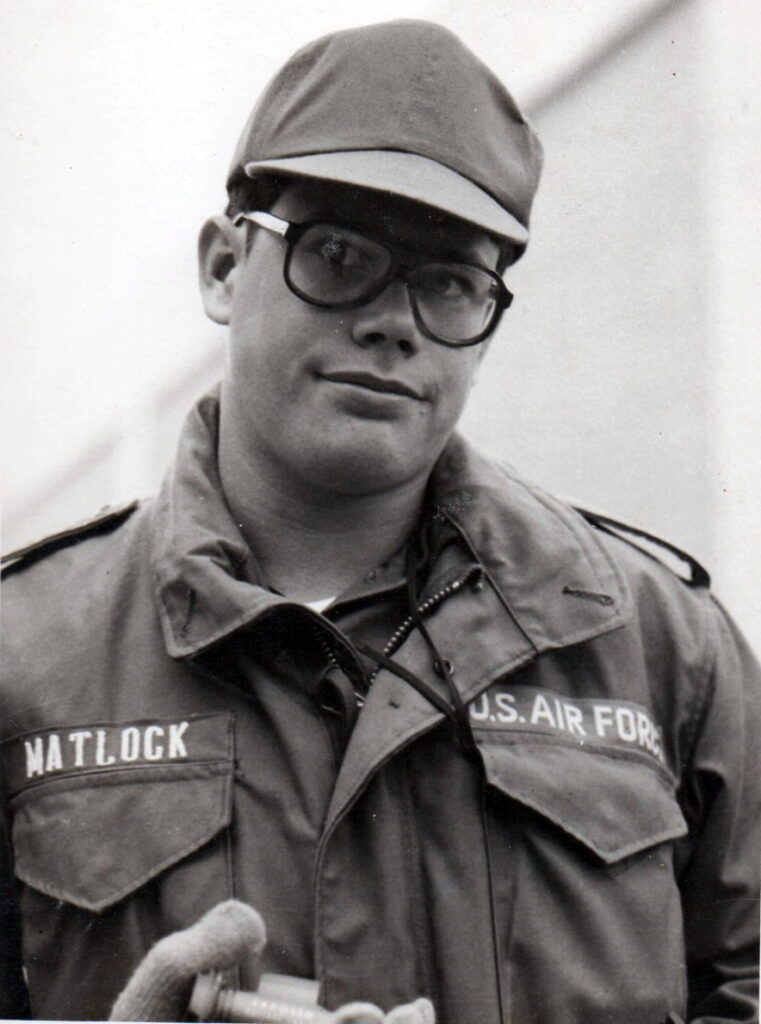
Basic Training and Photography Tech School. I became a man, and no longer was I a son, dependent on my parents. I was able to make decisions, good and bad, for myself, I was trusted to be responsible, and I learned to earn that trust.
What professional achievements are you most proud of from your military career?
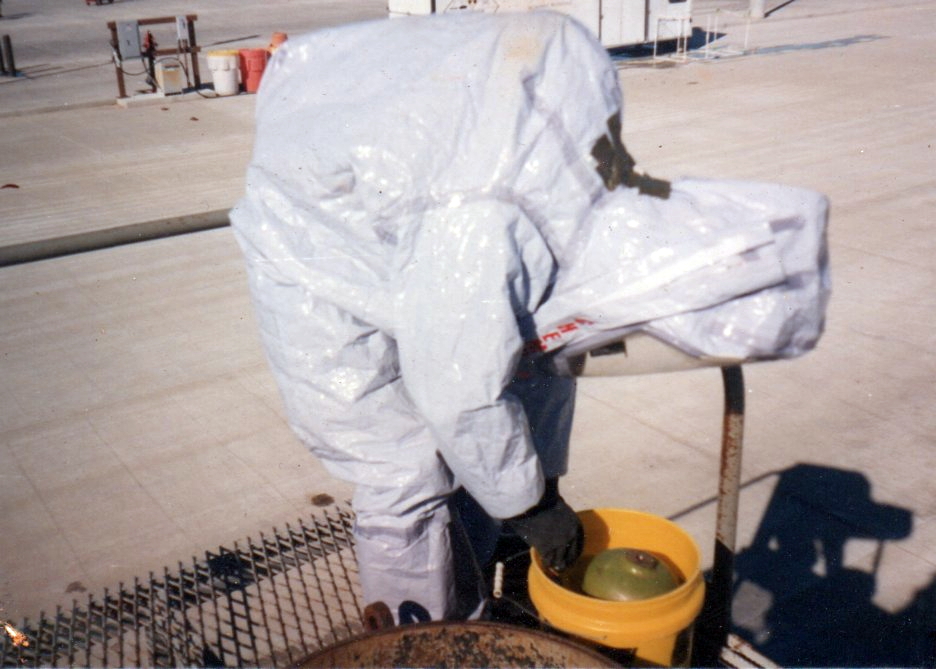
Receiving the title of Honor Grad from the Nuclear Emergency Response Training (NETOPS) school. I scored the only perfect on the final exam in the school’s 25-year history.
Of all the medals, awards, formal presentations and qualification badges you received, or other memorabilia, which one is the most meaningful to you and why?
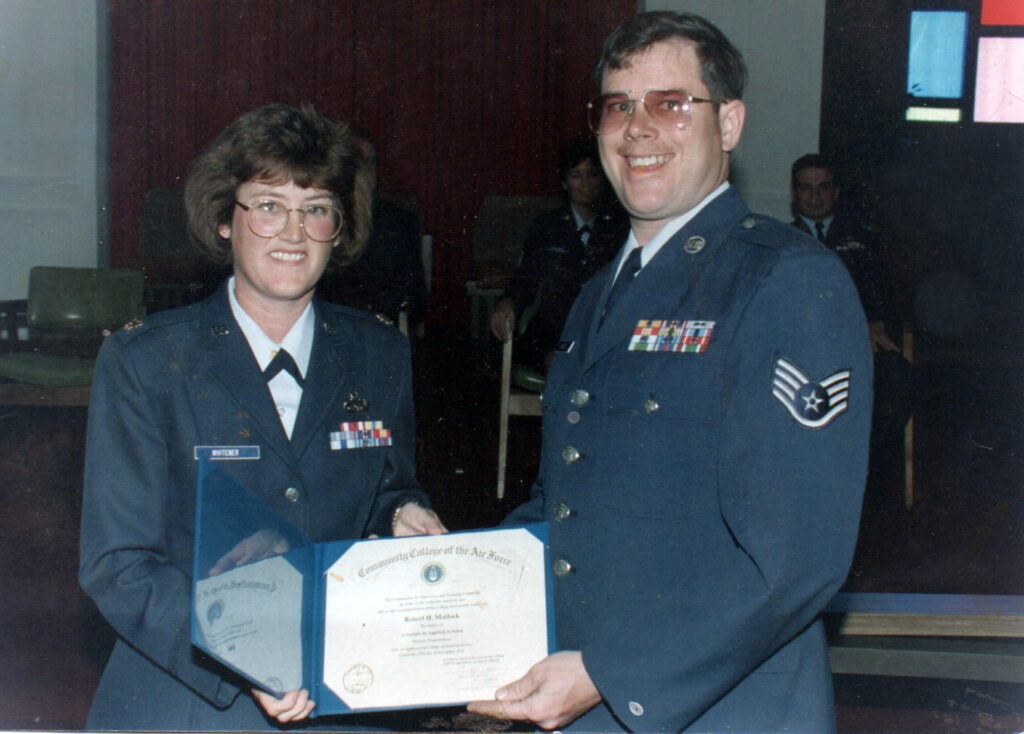
My Retirement Certificate shows how much I love my country by being willing to set aside my youth for 22 years to protect the country.
Which individual(s) from your time in the military stand out as having the most positive impact on you and why?
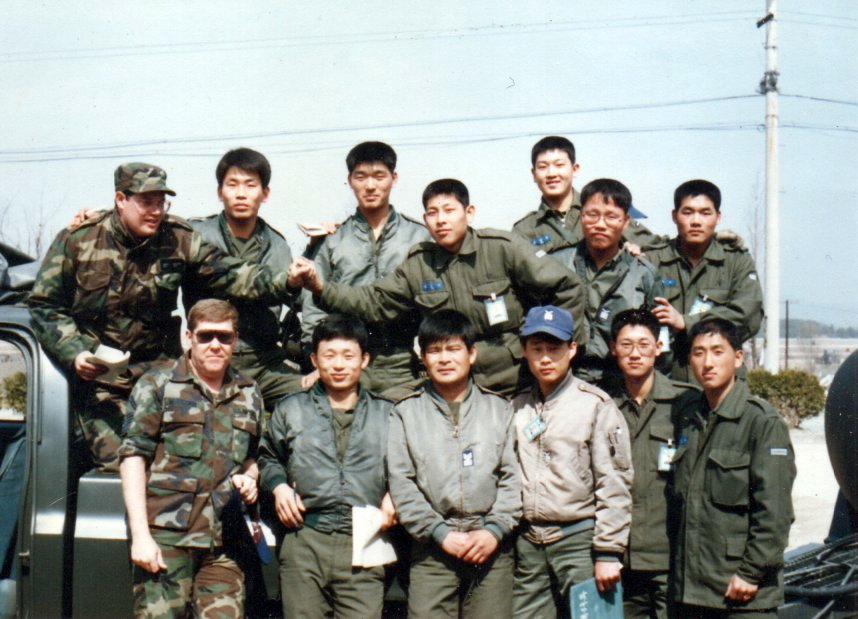
TSgt Raymond Decker was my first Active-Duty supervisor. TSgt Decker taught me how to be an Airman, and he showed me how to navigate through the minefield of office politics.
List the names of old friends you served with, at which locations, and recount what you remember most about them. Indicate those you are already in touch with and those you would like to make contact with.
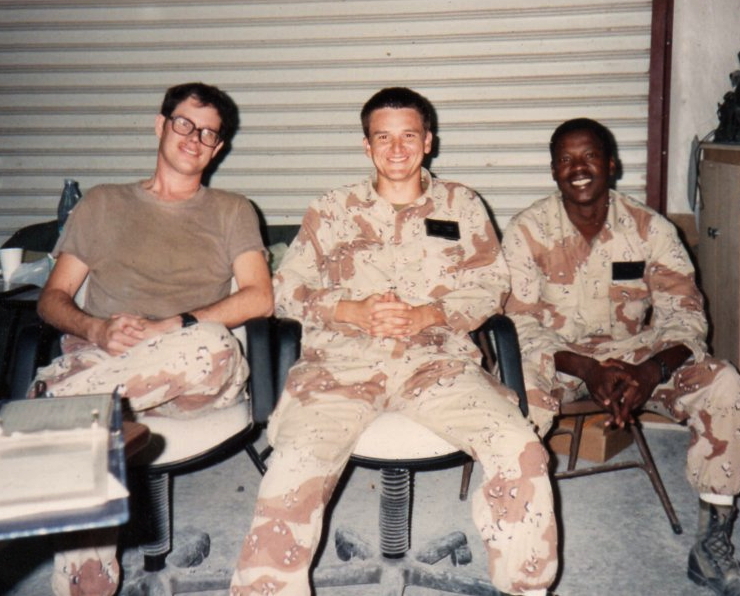
1978 Lowery AFB Photo Training
Dora Ellen Faith, the big sister I never had, taught me a lot about how to act like an adult and not just a grow-up kid.
1980-1985 Barksdale AFB
Raymond Decker, my first supervisor, taught me a lot of a lot about Intershop politics and how to deal with it.
1985-1987 Myrtle Beach AFB
James Longworth, my supervisor, is an ok guy.
Stu Zimett is a great drinking buddy with whom I spent a lot of time drinking beer on Turkish Beaches.
1988-1990 Myrtle Beach AFB
Raymond J Maloney III, A great friend, me and him spent the Aftermath of Hurricane Hugo drinking beer and grilling the steak thawing in my freezer. He and I went to war together.
1990- 1991 King Fahd AB, Operations Desert Shield/Storm
MAJ Walter West
CAPT Donald “Big Guy” Caccamise
SMSgt Dave Johnson
MSgt Leo “Leo” Spring
TSgt Joe “Bear” Garza
TSgt Sam “Nuttin” Sheppard
TSgt Keith ” Bud” Skidmore
TSgt Steve “Phoenix” Stroud
SSgt Chris “Ground Hog” Curry
SSgt Jim “Hormone” Figart
SSgt Bob “Buck Rogers” Grijalva
SSgt Ray “Kicker” Maloney
SSgt Hank “Long Toe” Price
Sgt Don “Bond” Huisjen
Sgt Jackie “Lady” Kisinger
Sgt Mark “Sparky” Ackroyd
Sgt Dave “Dusty” Little
Sgt Sean “Stretch” Vasvary
A1c Daniel Watts
These are the Airmen I went to war with, men and women who served with honor. We were the Airbase Operability Squadron (ABOS)/ AON section. I was closer to these people (in the tents, in the bunkers, in the chow line, in the heat of battle, and our loyalty to each other) than any other human being (except my brother Dennis Matlock. I am better for having served with them and proud to have been surrounded by the finest serving in the AF. I hope they are all doing well, that God has greatly blessed them, and they have been very successful in all they have done since then. I included their radio call signs; we call each other by these names more than our given names. I miss them, and I have not been able to contact any of them.
1990-1992 Myrtle Beach AFB
Ray Maloney, Sean Vasvary, Mark Ackroyd, and my war buddies played golf, bowling, and basketball while working to close one of the bases EVER in the AF. Though we know we have gone our separate ways, I think of them and smile.
1992-1999 Cannon AFB
MSgt Jerry O’Connell, a hard but fair supervisor, retired and came back as a civilian in the same position. He was right most of the time and helped me a lot.
1999 Retired
Thank you, Air Force, For 21 and 9 months of the experiences of a lifetime.
Can you recount a particular incident from your service, which may or may not have been funny at the time, but still makes you laugh?
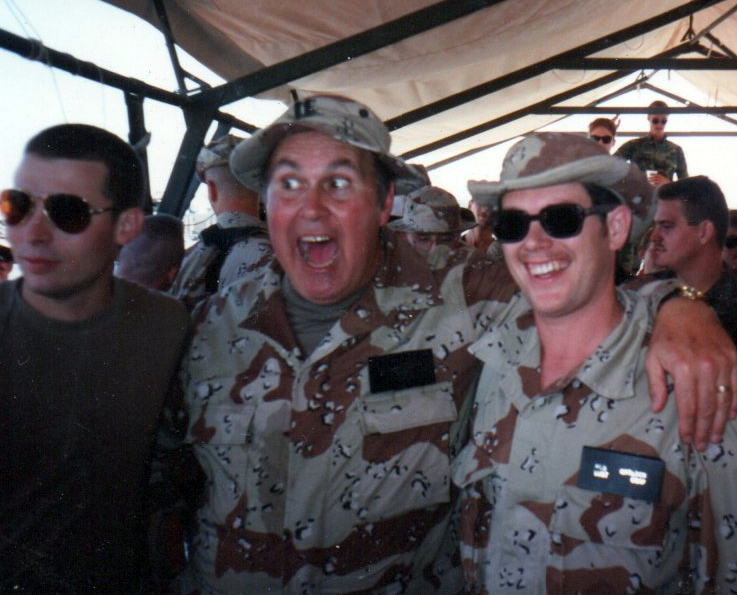
The time when an Airman named Guisallhart took a bunch of us from the dorm, all wearing costumes, to the Rocky Horror Picture Show. We did a Chinese Fire Drill at a stoplight; the family behind us FREAKED OUT!!
What profession did you follow after your military service, and what are you doing now? If you are currently serving, what is your present occupational specialty?
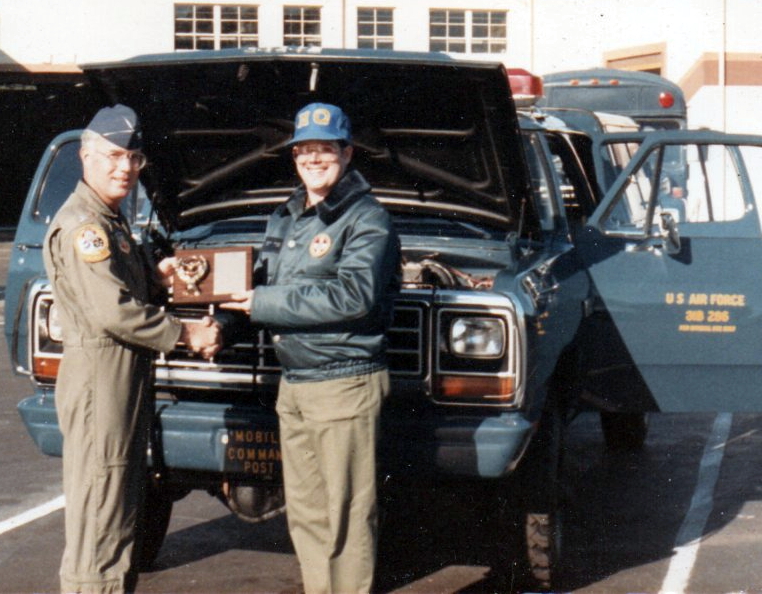
First, I went into custom photo printing; I printed photos at the main entrance to Pilgrim’s Pride Chicken and in the George W Bush Presidential Library. The company closed, and I worked at Pizza Hut for 17 years. I became disabled due to diabetes and have retired.
In what ways has serving in the military influenced the way you have approached your life and your career? What do you miss most about your time in the service?
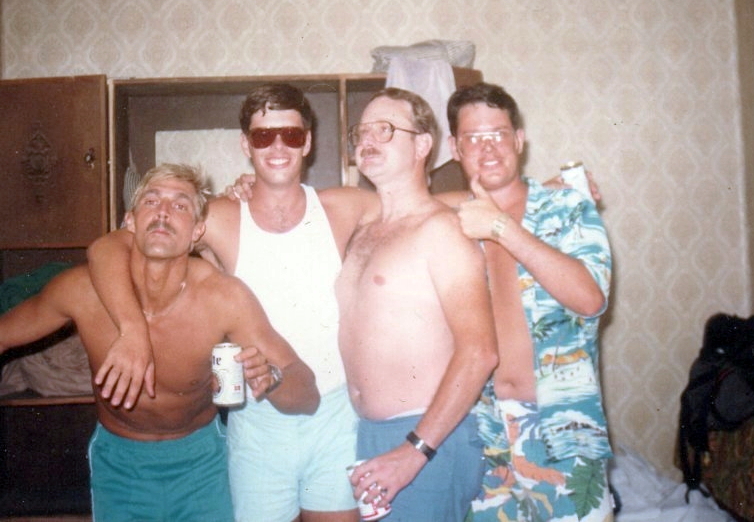
The Air Force taught me what it means to be an honorable man. It taught me to complete the mission, and it allowed me to work with many outstanding individuals. I walk with integrity and truth because of what I learned in the AF.
I miss the camaraderie and mission of the AF. I also miss the fact you work hard, and you get rewarded. I miss the travel; I have not been on an airplane since I retired. I miss the brotherhood.
Based on your own experiences, what advice would you give to those who have recently joined the Air Force?
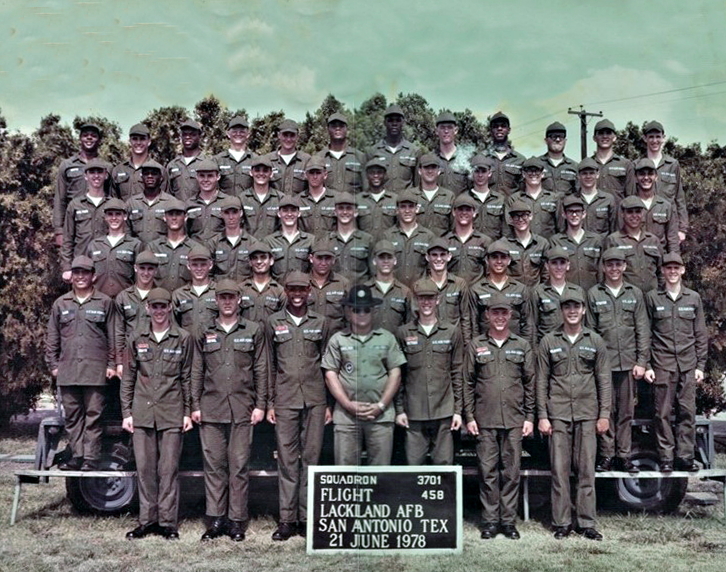
My granddaughter is joining the Air Force in the summer after graduation. I told her to listen to her supervisor, learn the job, take advantage of the educational opportunities, don’t spend her free time drunk, take every promotion opportunity, and live her life. All these things depend on it to keep your nose clean, and never forget to thank God and America for your blessings.
In what ways has togetherweserved.com helped you remember your military service and the friends you served with.
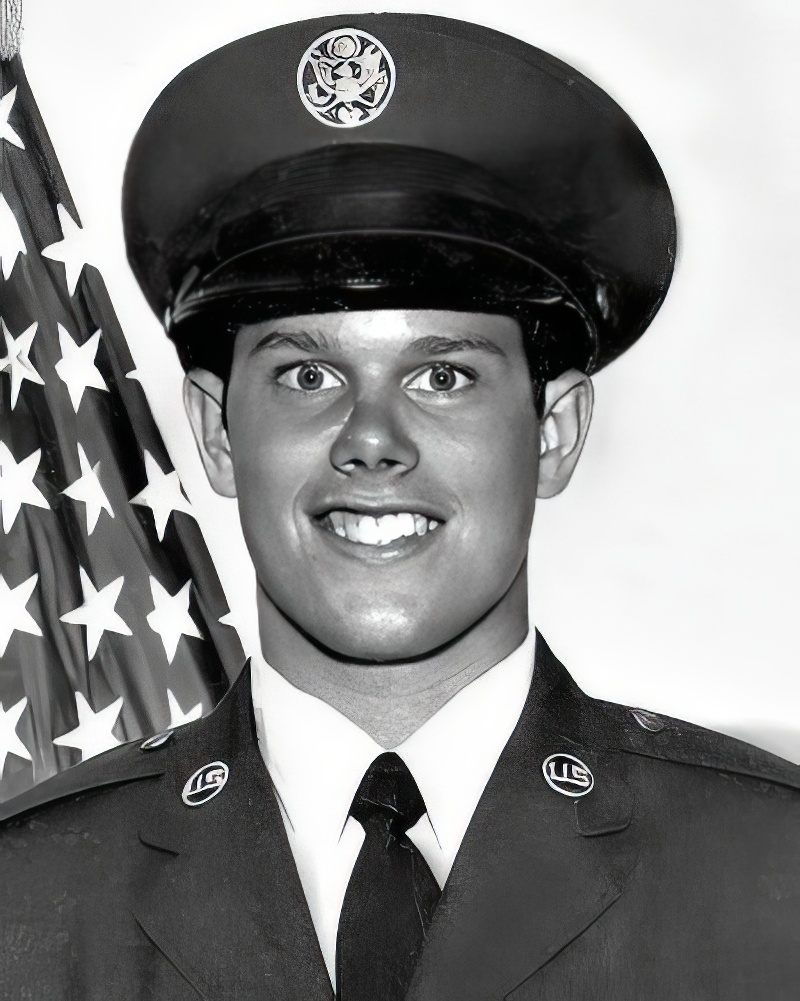
It allows me to share my experiences and photos. TWS enables me to sort my memories.
PRESERVE YOUR OWN SERVICE MEMORIES!
Boot Camp, Units, Combat Operations
Join Togetherweserved.com to Create a Legacy of Your Service
U.S. Marine Corps, U.S. Navy, U.S. Air Force, U.S. Army, U.S. Coast Guard
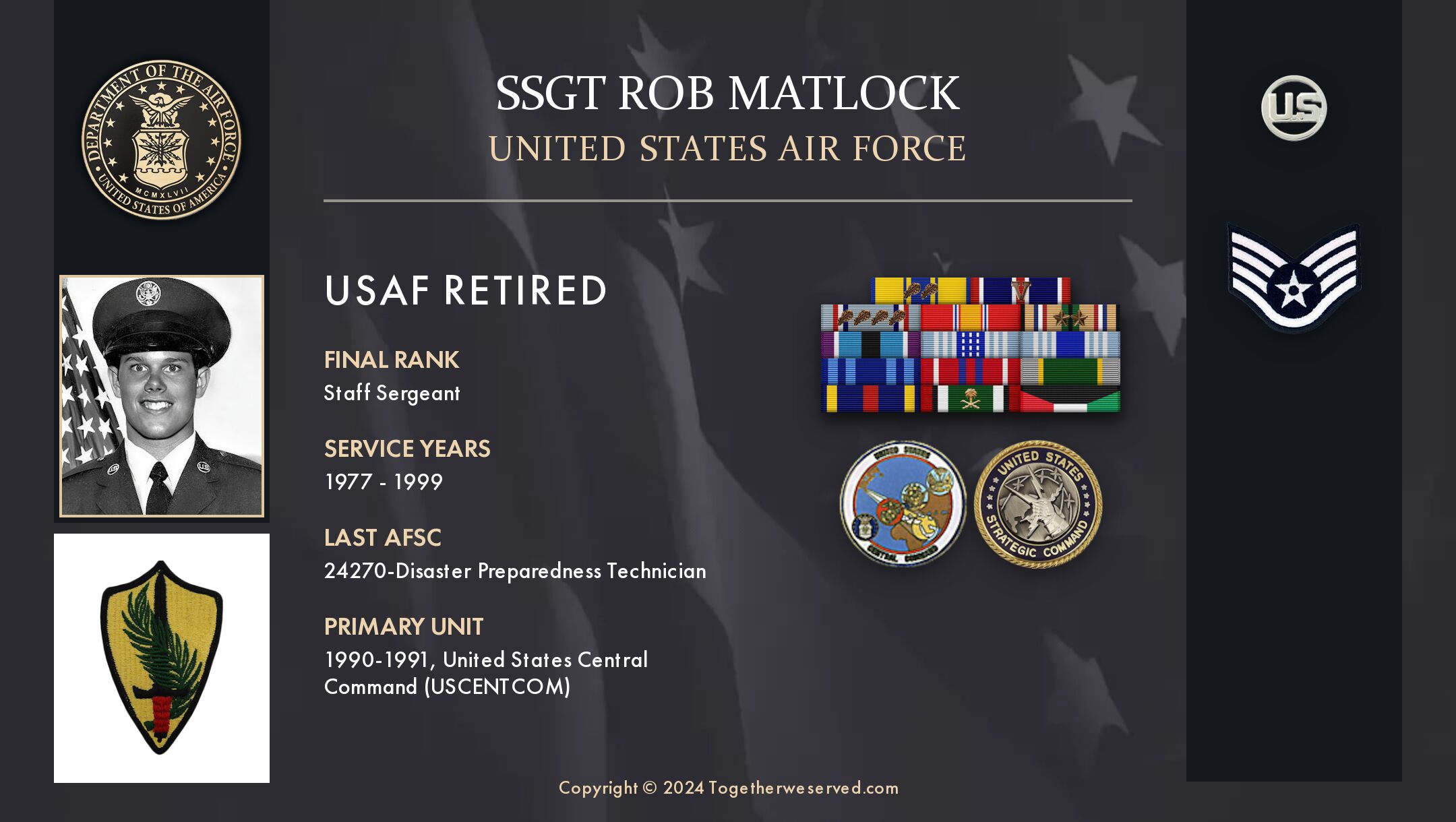
0 Comments